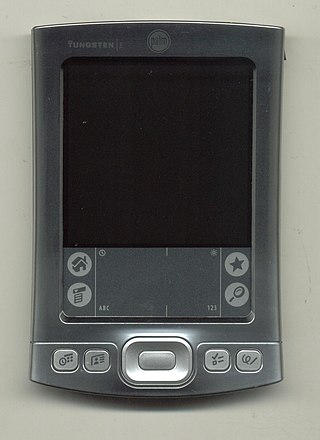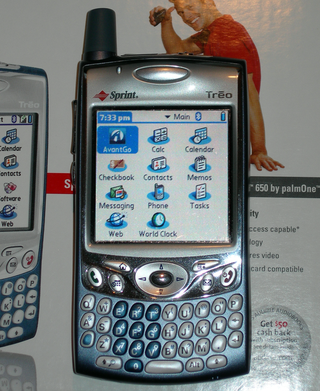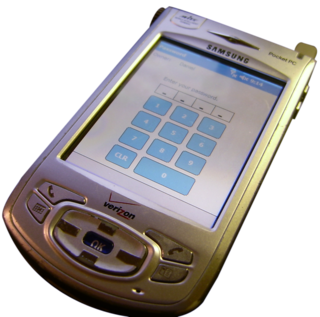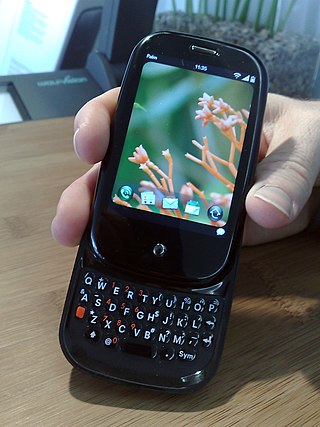
Palm is a line of personal digital assistants (PDAs) and mobile phones developed by California-based Palm, Inc., originally called Palm Computing, Inc. Palm devices are often remembered as "the first wildly popular handheld computers," responsible for ushering in the smartphone era.

The Tungsten series was Palm, Inc.'s line of business-class Palm OS-based PDAs.

The Palm Treo 650 is a Palm OS-based smartphone, the successor to Palm's Treo 600. It began shipping in November 2004, and was discontinued in 2008.
Non-Volatile File System (NVFS) is a flash memory file system introduced in the release of Palm's Personal Digital Assistant handheld models Tungsten T5, Tungsten E2, Palm TX, Z22, Treo 650/700/680/755p, and Palm Centro.

A mobile phone feature is a capability, service, or application that a mobile phone offers to its users. Mobile phones are often referred to as feature phones, and offer basic telephony. Handsets with more advanced computing ability through the use of native code try to differentiate their own products by implementing additional functions to make them more attractive to consumers. This has led to great innovation in mobile phone development over the past 20 years.
The Palm Treo 700w is a Windows Mobile-powered smartphone that was officially announced on September 26, 2005. As Palm's first Windows Mobile-powered Treo, the 700w offered an alternative for users who want or need to use Microsoft software. It was offered by Verizon Wireless, and other CDMA carriers. A newer version of this phone has been released, the Treo 700wx.
The Motorola Q is a Windows Mobile smartphone first announced in the Summer of 2005 as a thin device with similar styling to Motorola's immensely popular RAZR. Motorola in a partnership with Verizon Wireless released the Q on May 31, 2006. A version for Sprint was released early in January 2007 and one for Amp'd Mobile in April 2007.

The SPH-i700 is a Windows Mobile-powered smartphone manufactured by Samsung of Korea. It is a powerful and expandable second generation Pocket PC phone compared to others in its class. It includes a transflective display, a VGA camera, 300 MHz Processor and supports SDIO, making it a competent PDA. It includes a complete bundle of accessories, including: a case, stereo headset-mic, cradle and both a regular and extended battery. The wireless radio was reported to get strong signals, and offered good voice quality and fast data speeds on Verizon's Express Network. The unit runs the Pocket PC 2002 Phone Edition OS, and in July 2004, Verizon started shipping units running Windows Mobile 2003 Phone Edition. Windows Mobile 2003 Phone Edition offers the same improvements found in regular Pocket PCs running this OS: improved Pocket Internet Explorer, always on networking, an improved networking connection manager and overall speed improvements. Samsung makes a similar model called the SGH-i700 which is identical to the SPH-i700 except for it works on the GSM/GPRS network.

The Palm Treo 700wx is a smartphone offered by Sprint, Alltel and Verizon as an update to Palm's earlier release of the Verizon-only Treo 700w. It is Palm's second Windows Mobile Treo.

The Palm Treo 680 is a combination hybrid PDA/cellphone, or smartphone as the successor to the company's Treo 650.

The Treo 755p is a smartphone developed by Palm, Inc. It was released on May 15, 2007 as the first CDMA Treo without an aerial antenna. This Treo has a form factor similar to that of the GSM Treo 680, and is equipped with the full Palm OS. It has been described as a Treo 700p in a Treo 680's body.
The Nokia 6000 series or Classic Business series is range of mobile phones marketed by Nokia. This family of phones is notable for their conservative, unisex designs, making them popular with business users.

The Palm Centro is a smartphone marketed by Palm, Inc. beginning its release on October 14, 2007 offering the functionality of the larger Treo 755p in a smaller size.
Handspring, Inc. was an American electronics company founded in 1998 by the founders of Palm, Inc. after becoming dissatisfied with the company's direction under new owner 3Com. The company developed Palm OS–based Visor- and Treo-branded personal digital assistants. In 2003, the company merged with Palm, Inc.'s hardware division.

The BlackBerry Storm is a touchscreen smartphone developed by Research In Motion. A part of the BlackBerry 9500 series of phones, it was RIM's first touchscreen device, and its first without a physical keyboard. It featured a touchscreen that responded like a button via SurePress, Research In Motion's haptic feedback technology. Its competitors included Apple's iPhone, the Palm Pre, the T-Mobile G1 by HTC and the HTC Touch family.

The Palm Treo 800w is a combination PDA/cell phone offered exclusively by Sprint. It is Palm's third Windows Mobile Treo. The short-lived device was replaced by the Treo Pro.

The Palm Pre, styled as palm prē, is a multitasking smartphone that was designed and marketed by Palm with a multi-touch screen and a sliding keyboard. The smartphone was the first to use Palm's Linux-based mobile operating system, webOS. The Pre functions as a camera phone and a portable media player, and has location and navigation capabilities. The Pre also serves as a personal information manager, has a number of communication and collaboration applications, and has Bluetooth and Wi-Fi connectivity built-in.

The Palm Treo Pro is a combination PDA/cell phone offered in both GSM and CDMA. It is Palm's fourth Windows Mobile Treo. It replaced the short-lived Sprint Treo 800w.
MSM7000 is a series of system-on-a-chip processors manufactured by Qualcomm for handheld devices, especially smartphones.













